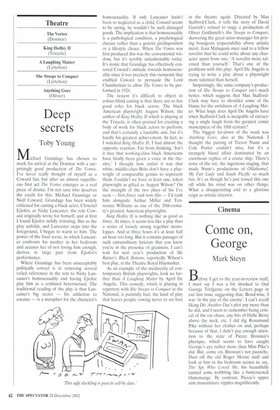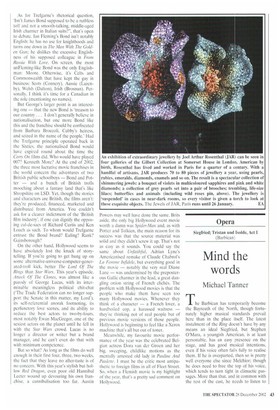Come on, George
Mark Steyn
Before I get to the year-in-review stuff, I must say I was a bit shocked to find George Trefgarne on the Letters page in our last issue suggesting that, Bond-wise, I was 'in the pay of the enemy'. I can't recall liking Die Another Day's plot any more than he did, and I seem to remember being critical of the car chase, any bits of Halle Berry above the neck, etc. I did dig Rosamund Pike without her clothes on and, perhaps because of that, I didn't pay enough attention to the state of Pierce Brosnan's physique, which seems to have caught George's eye rather more than Miss Pike's did. But, come on, Brosnan's not paunchy. Dust off the old Roger Moore stuff and look at him in the bedroom scenes in, say, The Spy Who Loved Me, his beautifully tanned arms wobbling like a butterscotch blancmange. By contrast, Pierce's upper arm musculature ripples magnificently.
As for Trefgarne's rhetorical question, 'Isn't James Bond supposed to be a ruthless toff and not a smooth-talking, middle-aged Irish charmer in Italian suits'?", that's open to debate. Ian Fleming's Bond isn't notably English: he has no use for knighthoods and turns one down in The Man With The Golden Gun; he dislikes the excessive Englishness of his supposed colleague in From Russia With Love. On screen, the most unFleming-like Bond was the only Englishman: Moore. Otherwise, it's Celts and Commonwealth that have kept the guy in business: Scots (Connery), Aussie (Lazenby), Welsh (Dalton), Irish (Brosnan). Personally, I think it's time for a Canadian in the role (mentioning no names).
But George's larger point is an interesting one — that the new Bond is 'treason to our country . . . I don't generally believe in nationalisation, but one more Bond like this and the franchise should be confiscated from Barbara Broccoli, Cubby's heiress, and seized in the name of the people.' Had the Trefgarne principle operated back in the Sixties, the nationalised Bond would have expired round about the time the Can On films did. Who would have played 007? Kenneth More? At the end of 2002, the three most lucrative movie franchises in the world concern the adventures of two British public schoolboys — Bond and Potter — and a bunch of British trolls mooching about a fantasy land that's like Shropshire on LSD. Yet, though the stories and characters are British, the films aren't: they're produced, financed, marketed and distributed from America. You couldn't ask for a clearer indictment of the 'British film industry', if one can dignify the opposing cul-de-sacs of Richard Curtis and Ken Loach as such. To whom would Trefgarne entrust the Bond brand? Ealing? Rank? Gainsborough?
On the other hand, Hollywood seems to have absolutely lost the knack of storytelling. If you're going to get hung up on some alternative-universe-computer-generated-troll kick, better The Lord Of The Rings than Star Wars. This year's episode, Attack Of The Clones, was almost like a parody of George Lucas, with its interminable meaningless political chit-chat (The Trade Federation can no longer support the Senate in this matter, my Lord'), its self-referential anorak footnoting, its perfunctory love scenes, and its ability to reduce the best actors to two-by-fours, most notably Ewan MacGregor, one of the sexiest actors on the planet until he fell in with the Star Wars crowd. Lucas is no longer a director or writer but a brand manager, and he can't even do that with with minimum competence.
But so what? As long as the films do well enough in their first four, three, two weeks, the fact that they leave no after-taste is of no concern. With this year's stylish but hollow Red Dragon, even poor old Hannibal Lecter wound up devouring his own franchise, a cannibalisation too far. Austin
Powers may well have done the same. Brits aside, the only big Hollywood event movie worth a damn was Spider-Man and, as with Potter and Tolkien, the main reason for its success was that the source material was solid and they didn't screw it up. That's not as easy as it sounds. You could say the same about Unfaithful, Adrian Lyne's Americanised remake of Claude Chabrol's La Femme Infidele, but everything good in the movie — notably the very real Diane Lane — was undermined by the preposterous Gallic charmer in the lead, a great dangling onion string of French clichés. The problem with Hollywood movies is that the people who make them have seen too many Hollywood movies. Whenever they think of a character — a French lover, a hardboiled cop, a harassed waitress — they're thinking not of real people but of previous movie versions of those people. Hollywood is beginning to feel like a Xerox machine that's all but out of toner.
Meanwhile, my favourite movie performance of the year was the celebrated Belgian actress Dora van der Groen and her big, sweeping, childlike motions as the mentally arrested old lady in Pauline And Paulette. I must be the critic most antipathetic to foreign films in all of Fleet Street. So, when a Flemish movie is my highlight of the year, that's a pretty sad comment on Hollywood.



























































 Previous page
Previous page